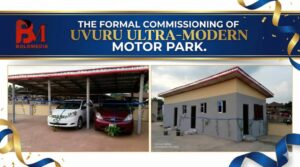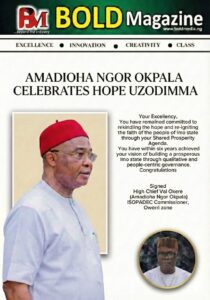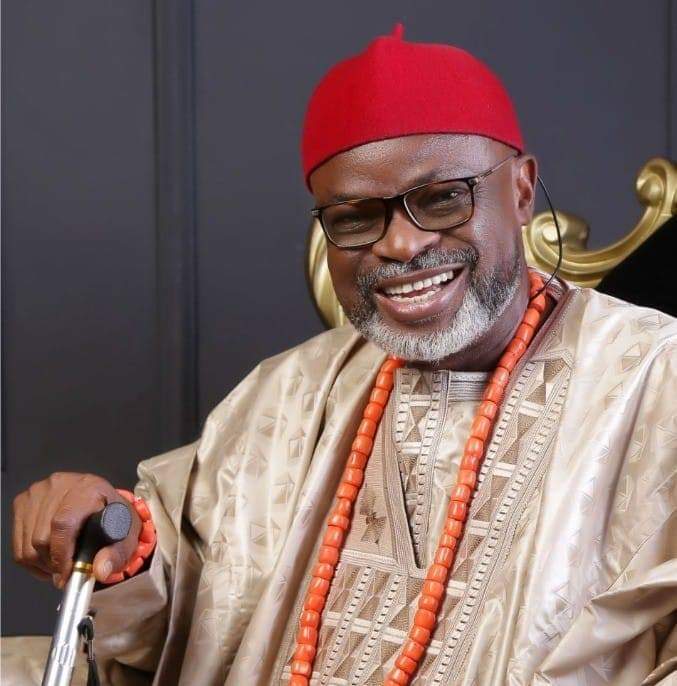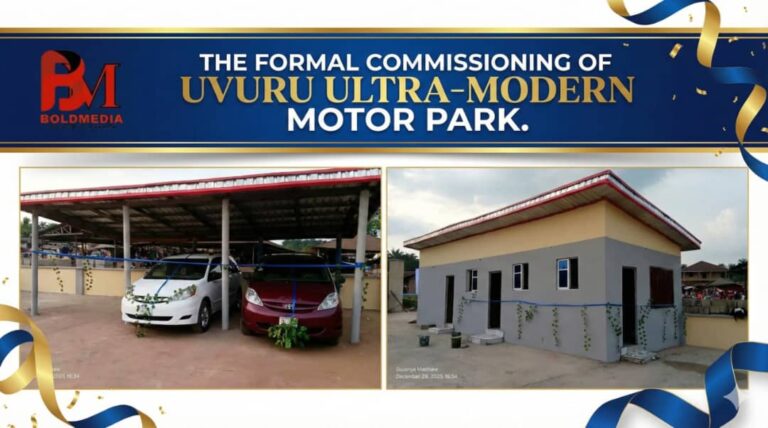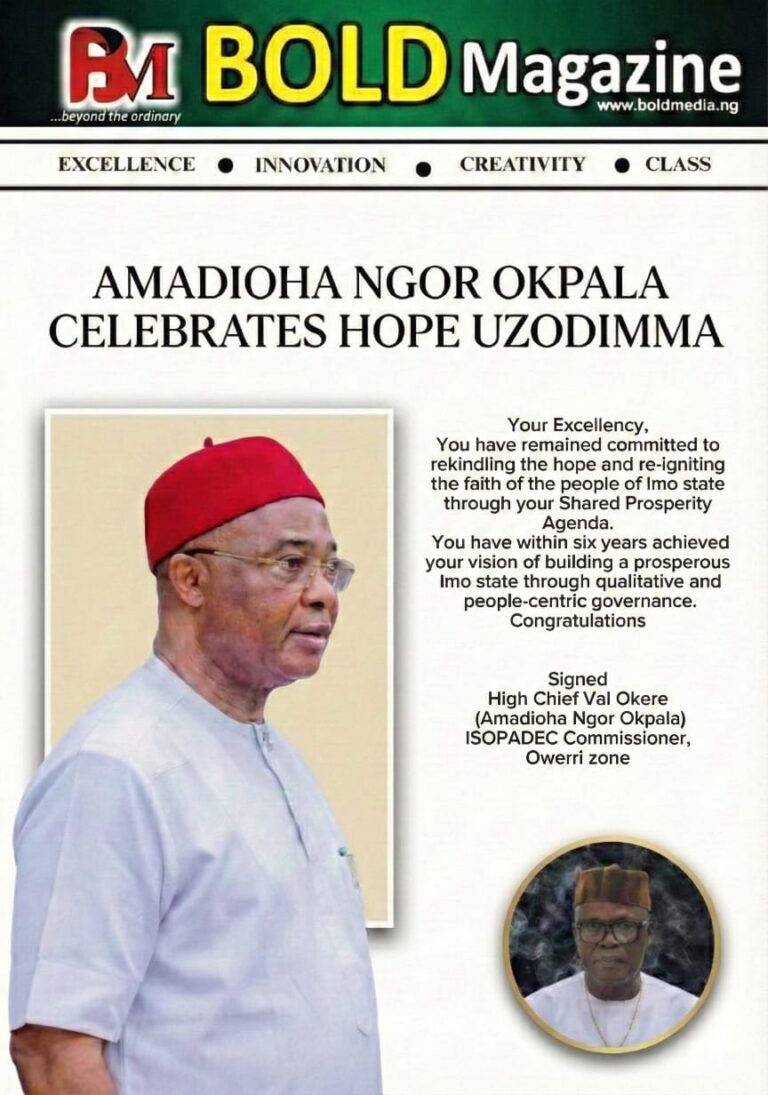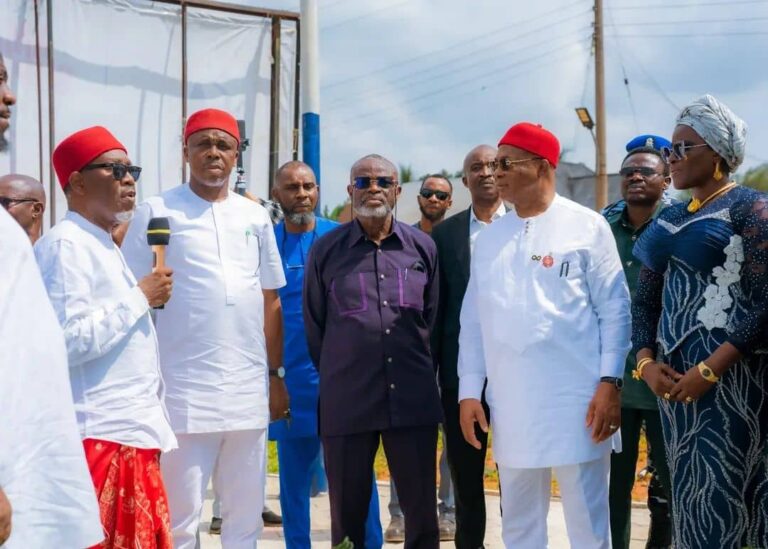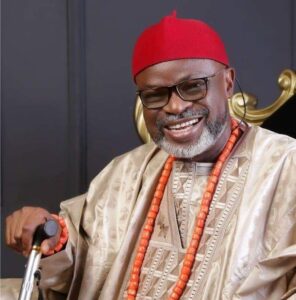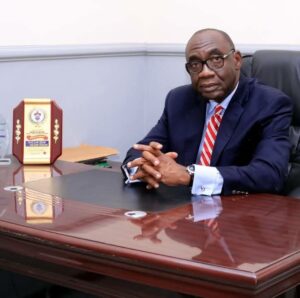BEING A KEYNOTE ADDRESS PRESENTED
BY
_Theodore Okwurunicheta Ejikemuwa (T.O.E.) EKECHI,Hon.; PhD; High Chief; D.Litts. (Honoris Causa).FNIMN, FCRSA. Ugo Eji Ejemba Ngor Okpala, Araba of Temidire, Ekiti. Chairman, Marketing and Media Group.
AT THE 2025 NOCIA CONVENTION IN BALTIMORE MARYLAND UNITED STATES OF AMERICA ON 25TH MAY 2025 ON THE TOPIC
CRISIS OF IDENTITY AND COMPLACENCY IN NGOR-OKPALA.
Perspectives and Implications for Socio-Political and Economic Development.
INTRODUCTION
There is a general belief among indigenes of Ngor Okpala that a sustained, deliberate plan and/or policy exists to make the area politically and economically backward and impoverished.
Hence, hardly would there be any gathering of the people, even among some of its most educated elites, whether at home or in the diaspora without talks about marginalization of the area and its people being the focus. There is no doubt that the area is grossly lacking in basic infrastructure and amenities associated with civilization, development and growth.
No doubt, also, that Ngor Okpala has become, over the last three decades, the fishing ground for political actors from other parts of Imo state. This situation has led to the tendency of some of the people to feel helpless, hopeless and mostly hapless, almost resigning to fate. But it is yet to be proved that there is a state- or group-sponsored policy or propaganda to place nde Ngor Okpala in positions of lesser importance, influence, or power that would have then, correctly translated to marginalization.
This presentation will strive to repudiate this disposition and tendency among some people of the area. Because that is not whom we are. To accept that there is a deliberate effort to keep us low and that there is little or nothing we can do about it is not who we are.
In the course of this discussion, we will discover that our forebears never proceeded with that sort of mindset. Instead, they were pace-setters in several fields while people from other parts of Imo, and indeed, Igboland merely struggled to catch up. Nature itself made it such that it would have been impossible for the area known as Ngor Okpala to be subservient to, or subdued by, any other part(s) of Igboland. In this wise I am referring to the sheer natural gift of human (with intellectual) resources, three traversing rivers and the vast arable land that make the area the envy of all parts of what is today known as Imo state. No other part of Imo State can boast of similar endowment.
If my above assertions are true, the naturally ensuing questions are: When, where and how did we get it wrong – becoming laggards, and how do we get out of this sorry, abysmal situation? These questions beg for answers, but firstly, let us share an overview of the Ngor Okpala story.
- OVERVIEW OF NGOR OKPALA .
At the risk of insulting your sensibilities, but for the benefits of our young sons and daughters who may not be familiar with their Ngor Okpala roots and story, let me remind you, and acquaint them with a brief history of the area. This will situate my presentation within context, and within the socio-geo-political equation of Imo state, nay Nigeria and by so doing provide an illuminating foundation for my thesis.
Location, Size, Population.
Ngor Okpala Local Government Area is located in the eastern part of Imo State, covering 523.1km2 with a 2022 projected population of 219,400, a population density of 419.4/km2 (according to the controversial 1991 population census). With headquarters at Umuneke Ngor, it is bounded in the north by Aboh Mbaise Local Government Area, south by Rivers State, east by Imo River/Abia State, and in the west by Owerri West and Owerri North Local Government Areas. It is held by many that in Imo State, Ngor-Okpala is the second largest local government by land mass following Ohaji-Egbema, and also, the second largest by indigenous population following Mbaitoli.
Brief History of Ngor-Okpala.
It is cited as one of the 774 Local Government Areas in the schedule to the constitution of the Federal Republic of Nigeria, 1991, as amended. The present Ngor-Okpala is one of the political entities that emerged from the efforts of the colonial powers as well as, later, regional and federal governments at the turn of the (20th) century in the course of the implementation of a policy of local government administration.
After the Native Court proclamation of 1901, Owerri District was constituted in 1902 with the appointment of Warrant Chiefs and the establishment of native Courts which became the first organ of justice and administration in colonial rule. Owing to the Women’s Riot of 1929, new reforms based on extended families and aimed at centralization were initiated resulting to a proliferation of courts.
By 1936 the Owerri Division received fifty-two of the one hundred and thirty-two courts in the emerging Owerri Province with each Court becoming a Native Authority (N.A.). Of significant interest to us in this brief is that in all the reforms local administration including the ones of the 1940s, that led to the formation of Clan Councils by merging many courts, Owerri Division then consisted of Mbaise (Nguru), Mbitoli/Ikeduru (Mbaike), Mbaukwu/Oratta (including Obube, Obibi, and Agbala), Ohaba(Oguta), and Ngor-Okpala. The Court Areas then in Ngor-Okpala were Etche (now part of Rivers State), Okpala-Eziama, Okwe, Onyeaghalanwnneya (Umuohiagu, Obiangwu and Logara), Umuaro-Imerienwe (Igba), and Obike.
It was not until 1976/77, that the General Olusegun Obasanjo military regime created twenty-one local governments out of the newly created Imo State, an exercise that saw the merger of Ngor-Okpala and Mbaukwu/Oratta County Councils to form Owerri Local Government with headquarters at Umuneke Ngor. Later, about 1989 Ngor-Okpala was demerged from Mbaukwu/Oratta from the old Owerri LGA to create a new Ngor-Okpala Local Government with headquarters, still at Umuneke and a new Owerri LGA with headquarters at Uratta.
Please, note that in all these geo-political configurations and reconfigurations of county councils and court areas, Ngor Okpala maintained its parity with other County Councils. But in 1996, boom, everything changed signaling the beginning of under representation and its adverse implications for development and growth.
Table of County Councils with their new Loca Government Councils Created in 1996.
CONSTRAINTS TO SOCIO-POLITICAL & INFRASTRUCTURAL DEVELOPMENT.
Having outlined who we were, where we are coming from and who we are, and having admitted our backwardness on some major indices of geo-socio-political cum economic development and growth, it becomes auspicious at this juncture to attempt to resolve the factors constraining our development – that is, an enquiry into the how and why of Ngor Okpala’s backwardness.
One Local Government, Low Representation.
As can be easily seen from the table above, regrettably, Ngor Okpala remains the only county council of old that remains a single Local Government Area till date. Put succinctly, it is the only political bloc in the old Owerri Division that retained as one LGA. The implications of this are very significant and symbolic: The area is entitled to only one LG Chairman, one House of Assembly member, only 11 wards (maximum of wards per LGA is 12), only 11 councilors, only one Traditional Ruler in the State Council of Traditional Rulers, only one Police or Civil Defence Division, etc.
And because by the rule of the 1986 delineation of constituencies no one LGA could constitute a Federal House of Representatives constituency irrespective of population, the area was arbitrarily merged with Aboh Mbaise making it entitled to a shared House of Representative member!Again, most appointments, especially, at the state level is on the basis of local governments. Consequently, in a political system where every of the commonwealth including infrastructure deployment are shared on the basis of quota and representation, the area is disadvantaged ab initio to receive less than 33% of the normal accruals. In terms of political contests, whether for the senate or governor, which often is supported by bloc solidarity, any candidate or aspirant from Ngor Okpala is doomed ab initio because its bloc solidarity is limited to one local government. All these have spiral effects on influence peddling (lobbying), individual and group empowerment as well as wealth creation because outside of Lagos the major source of wealth creation and empowerment is government. Deny a people adequate representation, you deny them everything!ii.
Crisis of Identity, feeling of Complex.
Notwithstanding the reality of a geo-political location called Ngor-Okpala (as can be verified on the state, national and world maps); notwithstanding a location inhabited by a people, by a population known and referred to as nde Ngor Okpala, it is worrisome that there are, yet, many persons and communities (even among the diaspora) who, even though, by law belong to this geo-political definition but who seem to be uncertain of, and disdained by what and what defines them as such. In other words, there are some people who are not proud or excited about their inclusion and/or the inclusion of some other clans within the Ngor Okpala geo-political definition. Of course, they are at difficulty admitting this disposition publicly. Confess it or not, their actions or inactions, and body language often betray them.
The obvious manifestations of this disposition can be seen in the following ways:a. Muted grumbles about the double-barreled appellation, “Ngor Okpala”, which is derived from the merger of the name of a different community with the name of a village of another community – Ngor and Okpala which had different identities before the two were merged into one to define a much larger area as a county council shortly before Independence.b. Reluctance to identify to outside enquirers, firstly and boldly, as onye Ngor Okpala instead of approximating as onye Owerri at first encounter.c. Difficulty in speaking publicly in the relevant Ngor Okpala dialect instead of mimicking the ori nma and kpa dialect of “nde Owerri”.d. Proclivity to identify quickly with an indigene of another LGA in any contest against another Ngor Okpala kinsman and a striking phobia to take positions that contradict the positions held by strong indigenes of other LGAs. So, very often times, in any Imo-centric socio-political pursuit of an Ngor Okpala man the first person to stab him is an Ngor Okpala kinsman. My personal experience after the Imerienwe Declaration testifies to this. Also, as we match towards the governorship contest in 2027/28 is it not absurd that the first persons to cast aspersions on the growing stature of Mazi Dr Mathew Amadi (Gburugburu) are Ngor Okpala sons? This admonition however, must not be mistaken as an endorsement by this author, but it suffices to draw our attention to the wicked tendency of Ngor Okpala people, always pleasured to pull their brothers down with or without the inducement of outsiders.
Truly, the entity called Ngor-Okpala today is an amalgamation of hitherto traditionally autonomous communities with limited ancestral, cultural homogeneity, perhaps, with more geographical contiguity, but broadly speaking, three distinguishable dialects spoken by the people. In its present state as a product that metamorphosed from international, national and local political experiences and gerrymandering, Ngor-Okpala may therefore be described as a quasi-tribal-league of largely independent communities with mixed cultural affinities and own historically local administrative heritage. Unfortunately, but truly, the principles of local cultural affinity, ancestral history and contiguity might not have guided extensively the anthropological considerations and configurations that led to its formation as a local government unit.
So, given these historical experiences, it is reasonable to posit that there exists the question of whether the people of Ngor-Okpala conscientiously and confidently see themselves as one people or whether there is a doubt in their identity and homogeneity. Bluntly put, and without any fear of contradiction, it is arguable that there is weakness in patriotism in the consciousness of a reasonable population of nde Ngor Okpala – home and abroad, male and female, married and single. In other words, our people are not overtly proud of their ancestral grouping. Of course, all these have the consequences of weakening cohesion and therefore inhibiting spontaneous initiatives for development and growth.
iii. Comfort induced complacency.
One theory has it that the initial lag among indigenes of Ngor Okpala in areas like education, wealth acquisition and general hustling compared with their neighbours in places like Mbaise, Mbaike, Owerri and indeed the rest of Imo was due to a certain complacency that arose from their self-sufficiency in food production. It is argued that for a people who other clans were coming to buy farm produce and provide labour in their farms, the urge to move out in search of greener pastures was non pressing since the ‘green pasture’ was already there with them.
In those days, what our people used to refer to as nde Ekperekpe of Mbaise; Nde Isoma from the present day Mbaitoli/Ikeduru and the most parts of present day Orlu zone used to come to Ngor Okpala to buy agricultural produce to sell in their areas to feed and train their children. As a matter of fact, a good majority of men (and women!) from these areas mentioned came to provide farm labour and many even settled in Ngor Okpala.
A good illustration is Umuowa town in the Orlu local government area of Imo state and Umuowa in Ngor Okpala. Today, it has been fully established that Umuowa Ngor Okpala are descendants of Umuowa Orlu people who settled in the present Umuowa Ngor Okpala area in the course of farming and trading. As a further illustration, the names of the native gods in the two Umuowas are the same: Ogirishi and Alakumeze. Both have Eke Umuowa and Nkwo Umuowa markets. Not long ago the two Umuowas had a joint cultural festival to mark their common ancestry. One of the outcomes of that reunion was the conferment of chieftaincy titles on two illustrious sons of Umuowa, Ngor Okpala.
Nature itself made it such that it should be impossible for the area known as Ngor Okpala to be subservient to any other part of Imo nay, Igboland considering the sheer natural gift of the vast arable land that makes the area the envy of all parts of what is today known as Imo state. But there is always a tide in the affairs of men. Like everything concerning human existence, there arose vicissitudes and distortions in the economic equation of Nigeria which relegated agriculture to the background. As agriculture crumbled and oil money became the “source” of wealth, the Ngor Okpala stranger patrons left with the spirit of daring hard work, adventure and hustling, leaving nde Ngor Okpala with complacency of ji apu na ji!
But Diamonds are made under pressure… In essence, this theory suggests that the self-sufficiency in subsistent food production and supply ensured that our people were lethargic and indifferent to the mad rush for the oil money. So, at that time, nde Ngor Okpala were “saved” from difficult experiences that conditioned them against the strength, smartness, toughness and hardness to “make it in Nigeria” by all means, whether in politics, economics or other endeavours, or in the avarice of get-rich-quick syndrome. Though that complacency tendency made our people less vulnerable to the madness of avarice and the get-rich-quick syndrome now ravaging Nigeria.
Whether this theory of complacency is right or wrong, it sufficiently forms a basis for further enquiry as to why there is this gap in the area’s development indices compared to others.
NGOR-OKPALA YESTERDAY
A peep into the Ngor Okpala of yesterday in contrast with the version of today will be helpful in testing the veracity of the claims of marginalization.
A fellow writing some time ago on the subject of margnalisation of Ngor Okpala opined: “They will tell you that Ngor Okpala is the largest council in the state. It is the food basket of the state and the people are good – all in a bid to lure us to sleep”. The writer continues: “Outside, they laugh and smile with us, inside they frown and mock us; outside they talk good of us but inside we are (simply) nde Ngor Okpala; outside they talk love and genuine interest to help, inside, they scheme and plot how to finish us politically”. What the writer is saying with that strong language is actually a popular refrain by not a few Ngor Okpala people especially the youths that their brothers and sisters in the rest of the state try to make them believe that they love them but, that “beneath that seeming facade of love lies deep hatred and revulsion”. How true are these strongly expressed sentiments?
The question that naturally arises, therefore, is why do your fellow indigenes of Imo state play you such tricks? Is there really an outright hatred for Ngor Okpala people? Is there a deliberate state policy to ensure that they do not develop their potentials and possibly remain perpetually subjugated? To this, I hold a contrary opinion. At different fora, I have always tried to repudiate this tendency of some of our people to appear helpless and resigning to fate. Not to be misunderstood however, it would be the height of pretense and indeed a grand perfidy against the people to proceed as if claims of under-development in the area are not real. Of course, it is real as earlier acknowledged. But that is not marginalization.
The earlier we realized that ihe n’eme anyi shi anyi n’ahu (our predicament is from within us) the more feasible it becomes for us to be extricated from that predicament. A self-inflicted injury that debilitated a contestant cannot be visited as assault on other contestants who sustained their own race to lead in the contest. A commission of suicide by a depressed person cannot also be visited as murder against his thriving neighbour.To accept marginalization is to accept that there is a deliberate effort to keep us low and that there is little or nothing we can do about it. As noted earlier, that is not whom we are because our forebears never proceeded with that sort of mindset. Instead, they were pace-setters in several fields while people from other parts of Igboland merely struggled to catch up.
One classical illustration is that of late Dr. Basil Nnanna Ukegbu. In 1958, Nnanna Ukegbu, a son of Ngor Okpala, founded and built what became one of the best secondary schools in the defunct Eastern Region, the Owerri Grammar School at Imerienwe. Four years later, he led the Ngor Okpala community to build another secondary school that also became famous in the entire region – Ngor Okpala High School at Umuneke Ngor. These two schools were pioneer secondary schools in the area then known as Owerri Division, providing the opportunity for secondary school education for majority of young men and women from the Owerri Division and beyond in the late 1950s and early 1960s. That was not all. Quite a good number of students from the clans of Owerri Division were beneficiaries of the scholarship scheme put in place by the proprietor of the Owerri Grammar School, Basil Nnanna Ukegbu.
In 1959, the same Ukegbu, onye Ngor Okpala contested for the Owerri Southwest Federal constituency seat in the Federal House of Representatives (consisting of Ngor Okpala and the Mbaise County Councils) defeating his main opponent, Dennis Abii of Mbaise who had the backing of the then Premier of the Eastern Region, Dr. Michael Okpara. Ukegbu, an Ngor Okpala son defeated the candidate of a powerful Premier to represent the Owerri Southwest Federal Constituency on the platform of the defunct National Convention of Nigerian Citizens (NCNC) and served as Minority whip!
Fast forward to 1980/83, same man, an Ngor Okpala fellow founded the first private university in Africa – The Imo Technical University, in partnership with three highly reputable Black-owned universities in the United States of America under the auspices of the Technological and Economic Development Mission (TEDEM). Thus, on December 10, 1980, Dr. M.I. Okpara formally launched TEDEM at Imerienwe.
In 1979, he was a co-founder and Deputy National Chairman of Great Nigeria Peoples Party, as well as the Governorship candidate for the old Imo State (now comprising Imo and Abia States plus part of Ebonyi State). The contest which was eventually won by Sam Mbakwe is symbolic and significant in the annals of Imo political history.
At the other end of Ngor Okpala, during the first republic, Sir Onyeso Nwachukwu, another Ngor Okpala son, a foundation member of the Zikist Movement, represented the entire Owerri Province in the Eastern Regional Housse of Assembly where he served as Chief Whip. Another illustrious son, Eze Daniel Okereke was the first Speaker of the Eastern Regional House of Assembly, and at a time, the Acting Premier of the Eastern Region.
Maria Eke (nee Egu), was an Ngor Okpala daughter who made headlines and sat side by side with the likes of Yar’Adua and Atiku Abubakar. The likes of Dr Mrs. Kema Chikwe (former Minister of Transport and Aviation) proudly admits that she owes her tutelage to Ndaa Maria – what some people came to describe as the Marian School of politics!
In music, Kabaka Godwin Opara and Dan Satch Opara all sons of Ngor Okpala (Imerienwe and Obiangwu respectively) were leading founders of the legendary Oriental Brothers International Guiter Band.
Ngor Okpala pre-civil war, and first decade of post-civil war history is replete with heroic exploits of our sons and daughters in political and socio-economic endeavours. Thus, the forebears of the area discharged and acquitted themselves creditably with shoulders over and above our present “tormentors”!
NGOR-OKPALA TODAY.
Following from my presentations thus far, it is noteworthy that there are no significant structural shifts or changes in the conditions under which our forebears and the present generation operated. The identified constraints of (i) only one LGA, low representation, (ii) crisis of identity, feeling of complex and (iii) comfort induced complacency were apparent, yet our forebears exceled. So, ana lee nga miri shiri baa n’ime opi ugboguru (how did we get into this quagmire)?
Hear me: A major plank of my thesis therefore is that the problem of Ngor Okpala that transmuted us from frontrunners to laggards is a generational flop. And history supports my assertion that it is the (outgoing) generation of leaders – politicians and political actors – that failed to maintain the Ngor Okpala momentum of frontrunners in Owerri Division nay, Imo State as bequeathed by our forebears.My thesis is that there was a wrongful change of batons! Our trouble might have started when suddenly, at the first decade of the second republic some categories of actors grabbed socio-political power and started acting for our collective interests. Some had education but lacked the economic power, guts and courage to drive their convictions. Those that had economic power were lacking in character and education to serve faithfully and intelligently. Those with education, character and economic power were so insignificant that they were easily drowned. Because we did not continue with our best, mediocrity and quackery cascaded down to community (including Ezeship) and village leadership. To remain relevant and sustain a mediocre hegemony, subservient, servitude and follow-follow relationship with the rest of Imo became desperate strategies for survival.
The resultant commotion led to mundane, acrimonious rivalry which bred a terrible, self-destructive culture of pull-him-down syndrome. Short span selfish aggrandizement at different levels of socio-political representations ensued. So, even the few representatives we had/have in the socio-political space, like sheep leading an army of lions could not save themselves let alone saving their people. Thus, while our forebears plied our strengths to surmount our weaknesses because of their relatively strong grounding, character and good faith, the same weaknesses became the Achilles heels of present leadership for reasons already espoused. Hence, we are where we are today.
GOING FORWARD
Are we finished? No!
” One LGA” Can Be Strength : As we bemoan our faith as a people consigned to only one local government area when other parity blocs have two to three, we must resolve not to dwell so much on the past but determine to make the best out of our present minority status. While “allocations” (in all forms) are relatively smaller, appointments fewer and share of the commonwealth therefore limited, my view, my charge is that rather than get disillusioned, this shortchanging should drive us to unite extensively and intensively in solidarity to the envy of our neighbours, who in spite of their splits are still engulfed in wars of attrition. Afterall, for every disadvantage there must be an advantage.
A major development indicator which points to Ngor-Okpala as having great potentials for development is the massive expanse of arable land – so fertile that there is almost no need for inorganic fertilizer for most basic produce. With an international cargo airport (with produce bias) at Obiangwu, an AfrExim International Quality Assurance Centre at Umuowa, three all-season rivers – Imo, Ogechia and Oramiriukwa flowing equidistantly through it, no other part of Imo State is best suited for an agricultural revolution as the quest for non-oil foreign exchange earning becomes a national imperative.
Complacency, Not Again
Nigeria is aware, Imo is aware, but are nde Okpala aware? Even if they are aware, are they just onlookers in the scramble for their national resources? Umunnem, let me alert you: there are a lot of discussions going on now for part or whole concessions of the Imo Cargo Airport. Nde ebeke anyi ha sokwa ya? There is a mad scramble for our prided arable land by strangers from Orlu, Mbaise and Abia and our people are whimperingly giving it away for peanuts. Nde ebeke anyi, unu so kwa ya? Are you also aware that part of about 2,000 hectares of our prided and flaunted arable land ostensibly acquired by the state government has been willed to another stranger-, religious-businessman to the chagrin of the natural owners who are now sniffing and whimpering? To be clear, the impression must not be created that Ngor Okpala is anti-development. But we have a duty to constructively draw the government’s attention that the single beneficiary of that gargantuan portion of land is a private businessman who should not benefit unfairly from government against the people. Since the initial purpose of acquisition of the land have elapsed severally, the land owners should be allowed of their own free will to negotiate a fair economic price with the proprietor of the Zion Ministry. The Imo State Government cannot in good conscience demonstrate that Zion Ministry’s program of building a university, secondary, primary and creche schools, water and candle factories, hospital and residential estate, which they claim, represents in any sense, overriding public interest.
As I make this presentation, herdsmen are inching our touted arable land, day-by-day, converting it to grazing field and establishing dominion over it. The worst that will befall our fate is when the last bastion of our hope – land – falls under the ownership, control and occupation of those we accuse of marginalizing us. Owu onye kwe chi ya ekwe
So, as we cry over lone LGA, let us be reminded that during the last local government creation exercise that saw us short-changed, the benefiting blocs were influenced by the efforts of their patriotic sons and daughters who pulled their ‘weight’ to earn ‘patronages’. Only docile leaders like in Ngor Okpala were satisfied with their bombastic, verbose prose presentations which yielded nothing. May I remind us that another excersise has been announced. Though it appears unserious in the typical Nainja style it is always counselled that one should err on the side of caution. We cannot be complacent over this at this time. LGA creation is not determined by the literary, or even demographic sophistication of an application alone. It must be supported by a network of other net worth interventions.
To fight complacency, the clarion call is for the amassing of the critical mass of elites for radical grassroots mobilization and reorientation geared towards interventions for economic, political, and social transformation. To achieve this, we cannot pretend that it is possible without the dollar-influence (not necessarily cash) of our diaspora indigenes. The time to act is NOW. To wait till tomorrow is a rehearsal for the consequences of another shade of COMPLACENCY!
Identity Renaissance to End Complex
So, even if the socio-cultural heritage of Ngor Okpala did not support homogeneity of the communities in the creation of the local government, our socio-political experiences of almost a century should be enough adhesive for bonding and convivial cohesion. The stories of other LGAs are not antithetically different from ours. So, why should our differences define our character. Only those who emphasize on the differences instead of focusing on what bind them together suffer the Babel syndrome.
This paper has explored the how and why of the phenomenon of identity crisis. My charge is that we must awaken the consciousness of our people, particularly the youths, to the fact that Ngor-Okpala as a place and as a people is a reality; that the earlier they accepted the challenge and inevitability of solidarity of oneness, one destiny, the earlier they are capable of overcoming the challenges that set them backwards in the schemes of things in Imo and nay, Nigeria. In fact, Ngor-Okapla is ripe for transition through citizens intentional collective efforts to demonstrate a high confidence in their existence through an endearing and enduring sense of brotherhood within and outside the boundaries of the locality.
The examples of the heroic exploits of Nnanna Ukegbu, Onyeso Nwachukwu, Maria Egu, Kabaka Godwin Opara, Dan Satch Opara, and several others should be taunted to galvanize our people out of any feeling of complex. If they, then, could break barriers, our own generation can also do it.
Afterall, individually, Ngor Okpala, today as before, ka nwere mmadu – of both timber and caliber – in all spheres of human endeavor. The elevation of Ngozi Olehi and Soronnadi Njoku to S.A.Ns, the appointment of one of our daughters as an UN Under Secretary General, Dr Cliff Ogbede as pioneer Executive Director of the South East Development Commission, Barrister Eze Onyekpere and Dr Sam Amadi (right activists), Professor Linus Umezuruike Opara (world renowned post-harvest technologist and AU Laurate), Mrs Emily Emeka Opara (NDIC ED), HRH Engr Fred Nwachukwu (Acting Deputy Chairman (Imo State Council of Traditional Rulers), etc, are testaments of the resilience and capacity of nde Ngor Okpala.
On my part, I served (whether for good or bad) as National Director, Planning and Monitoring, APC Presidential Campaign Council in 2015, and 2019 before representing the South East as a Federal Commissioner in the Governing Board of the North East Development Commission.
At the risk of sounding immodest, though I served in the Okorocha administration as Commissioner for Information and Strategy, like most Imolites at that time, I was completely opposed to his plans to rail-road his son-in-law as his successor. So, I convened in my country home on March 12, 2018 a coalition against that move and other acts of perfidy by the governor through the now historical Imerienwe Declaration – a resolution to put an end to Okorocha’s impunity.
I can state without any fear of contradictions that that was the very root of the movement that eventually stopped Okorocha from imposing his son-in-law on the state as his successor. Whether the present regime has done better than the previous, I crave your indulgence, is outside the scope of this paper (smiles).
CONCLUSION.
In conclusion, let me state unequivocally, make a fundamental declaration that it is the political arena which drives the socio-economic arenas in any geo-political bloc Politics is too serious to be left in the hands of idiots. To you our kith and kin in the diaspora and others at home, it is self-delusion to indulge in self-denial of partisanship. Such cliches as “onwe m juru m afor” (I am contented with what I have), “iji enyem nri”? (do you feed me?), “onweghi ihe nma nde politician g’emerem (there is no favour I would be expecting from politicians) are indicators and indications of complacency and/or complex. Such cliches are socially outdated and politically antiquated and obviously contradict the reality of today’s political economy!Please, hear me and hear me well:
Politics is a big, albeit risky business that ultimately affects all facets of our lives. To address the penchant on the part of some elements in the other parts of the state to see Ngor Okpala as a foot stool, we must take politics seriously, either directly or indirectly with corresponding investments in time, money and goodwill. No one is born a politician, not even those with degrees in political science. A people that invests wisely, reaps richly. A people who looks the other way while the jungle matures should be contented with the crumbs, that is, if they are not consumed in the jungle. After all, in the jungle, the natural rule is “the survival of the fittest”.
Udo diri unu…
Theodore Okwurunicheta Ejikemuwa (T.O.E.) EKECHI,Hon.; PhD; High Chief; D.Litts. (Honoris Causa).FNIMN, FCRSA.
Ugo Eji Ejemba Ngor Okpala, Araba of Temidire, Ekiti. Chairman, Marketing and Media Group.

